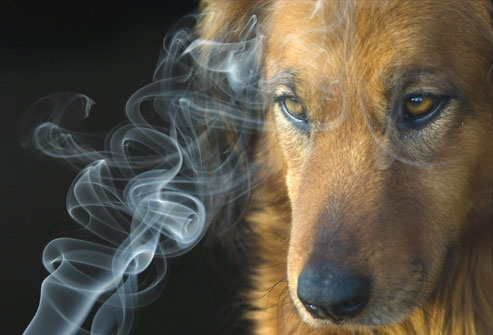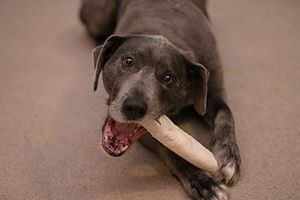
If you smoke, you should have first thought about its adverse effects not only on your health but also on your pet’s health. Second-hand smoke is defined as smoke that is exhaled or otherwise released into the air that can be inhaled by non-smokers, which includes pets. Third-hand smoke is the residue that is left behind on fur, skin, clothing, or furniture, even once it has cleared. Besides the obvious danger of lung cancer, cats and dogs lick the residual tar and nicotine from their coats, which can contribute to throat and mouth cancer.
Nosy animals also face potentially fatal nicotine poisoning from eating any tobacco products they meet. A study published by Tufts University found that cats living in homes with family members who smoke are more than twice as likely to acquire feline lymphoma cancer as compared to other cats. This kind of cancer was earlier thought to ensue because of feline leukemia. As per an Associated Press report, the results showed that in households where cats were exposed to smoke for five years or more, they became 3 times more exposed to the risk of developing diseases.
In a two-smoker household, the risk shot up by a factor of four. In some cases, felines are at a higher risk of developing cancer as compared to their human counterparts living in the same home. Dogs living with smokers showed an increased risk for nasal cavity and lung cancers. Long-nosed dogs, like Retrievers, have a bigger nasal surface area, which can lead to the accumulation of carcinogens emitted from smoke. On the other hand, shorter-nosed breeds, such as Pugs, show an increased risk of lung cancer.
This study was conducted by the Colorado State University (CSU) School of Veterinary Medicine by Professor John Reif, who is well known for studying the impact of second-hand smoke on dogs since 1992. The symptoms of lung cancer in dogs can include weight loss, chronic coughing, and fatigue. Signs of nasal cancer include swelling around sinus or the nose areas, sneezing and bloody nasal discharge. Be on the lookout for these symptoms and contact your vet as soon as you detect something is wrong.
 The best way to prevent your pet from being subject to health deterioration is to keep your pets’ environment tobacco and smoke free. Smokers who share their homes with pets should smoke outside and take extra caution when disposing of cigarette butts so that their pets can’t later consume them. Ask anyone who takes care of your pet about their smoking habits, and make sure to tour any pet-sitting or pet day care facilities keeping in mind tobacco awareness.
The best way to prevent your pet from being subject to health deterioration is to keep your pets’ environment tobacco and smoke free. Smokers who share their homes with pets should smoke outside and take extra caution when disposing of cigarette butts so that their pets can’t later consume them. Ask anyone who takes care of your pet about their smoking habits, and make sure to tour any pet-sitting or pet day care facilities keeping in mind tobacco awareness.
If you are trying to quit smoking, you can also take a number of precautionary steps to minimize the presence of second and third-hand smoke in your pet’s environment, such as stem cleaning your carpets, upholstery and curtains to remove any collected smoke from your house. Another thing you can do is bathe your pet to get rid of any leftover from her fur, and smoke outside to avoid the re-accumulation from your house.
Make it a point to not smoke when you are cuddling your pet or sitting close to him while in the car or at home. Try to decrease the number of cigs you smoke and eventually you will be able to cut this habit out entirely. When you stop smoking, the damaging effects of smoking will also abate with time, and this is why you should take some serious steps towards quitting smoking.